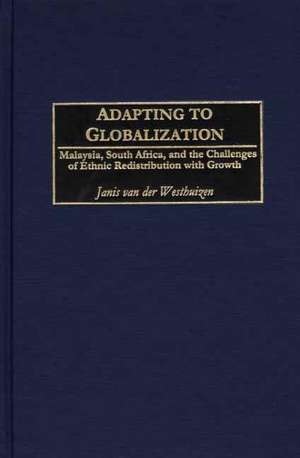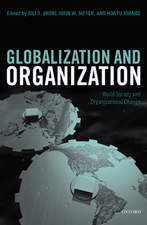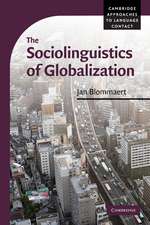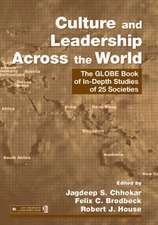Adapting to Globalization: Malaysia, South Africa, and the Challenges of Ethnic Redistribution with Growth
Autor Janis van der Westhuizenen Limba Engleză Hardback – 29 apr 2002 – vârsta până la 17 ani
Preț: 437.15 lei
Preț vechi: 603.86 lei
-28% Nou
Puncte Express: 656
Preț estimativ în valută:
83.68€ • 90.92$ • 70.33£
83.68€ • 90.92$ • 70.33£
Carte tipărită la comandă
Livrare economică 21 aprilie-05 mai
Preluare comenzi: 021 569.72.76
Specificații
ISBN-13: 9780275972530
ISBN-10: 0275972534
Pagini: 224
Dimensiuni: 156 x 235 x 22 mm
Greutate: 0.49 kg
Ediția:New.
Editura: Bloomsbury Publishing
Colecția Praeger
Locul publicării:New York, United States
ISBN-10: 0275972534
Pagini: 224
Dimensiuni: 156 x 235 x 22 mm
Greutate: 0.49 kg
Ediția:New.
Editura: Bloomsbury Publishing
Colecția Praeger
Locul publicării:New York, United States
Notă biografică
JANIS VAN DER WESTHUIZEN is a Senior Lecturer in the Department of Political Science, University of Stellenbosch, South Africa. He has co-edited South Africa's Multilateral Diplomacy and Global Change and published numerous articles and book chapters on South African foreign policy, state and non-state responses to globalization, the political economy of popular culture, and comparative politics of Southeast Asia and Southern Africa.
Cuprins
PrefaceAbbreviationsIntermediation Processes, Coalitions, and Structural ChangeThe Advance of Malay Capital: From Growth to RedistributionFrom the Reddingsdaad Movement to "Yuppiehood": The Nationalist-Corporatist Project of Afrikaner NationalismBack to Growth: Patrinage and Paradox of the Malaysian Competition StateANC Economic Policy in Transition: From Aspiring Developmental Towards Neo-Liberal Competition StateEchoes of History: From Volkskapitalisme to Black EmpowermentConclusionBibliographyIndex
















